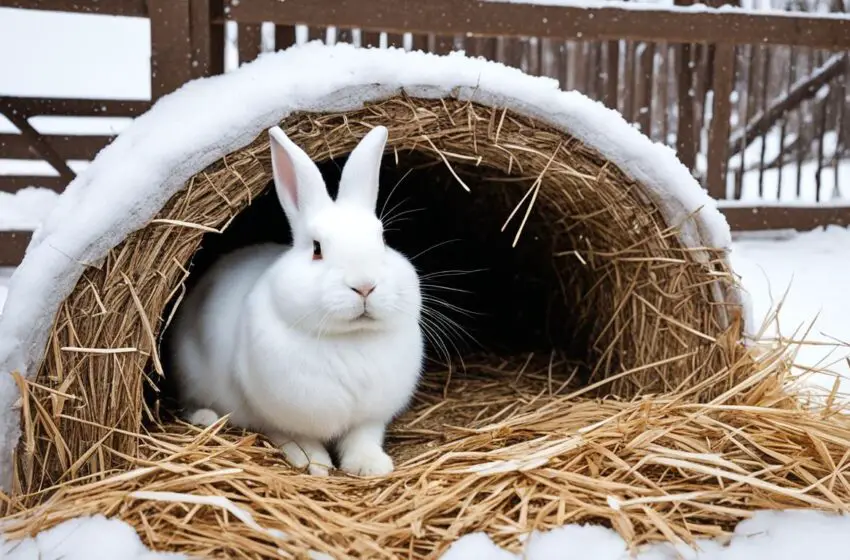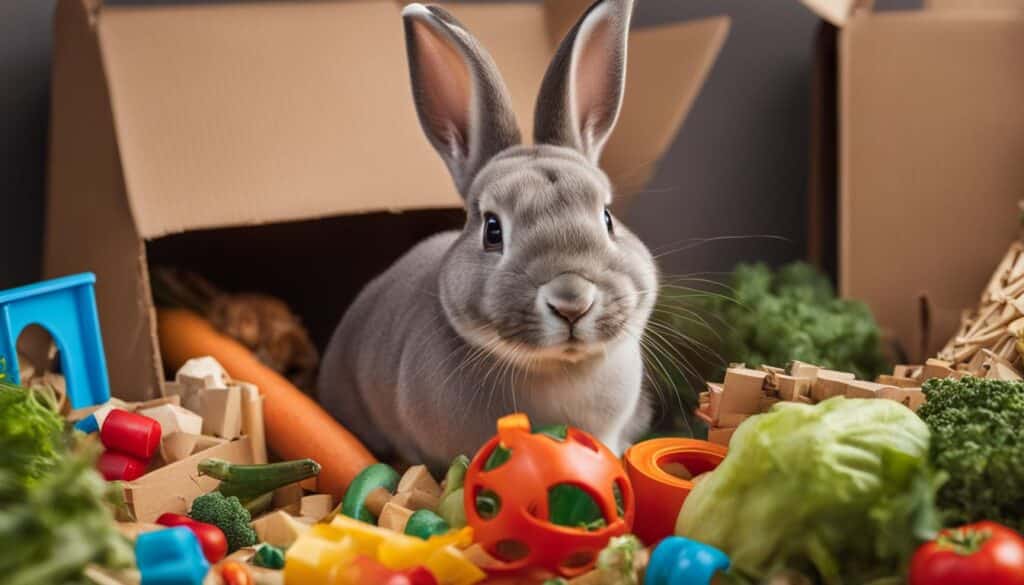Preparing Your Rabbit for Winter: Essential Care Tips

As the winter months draw near, it’s important to ensure the well-being of your furry friends. Rabbits, just like any other pet, require special care and attention during colder seasons. By taking the necessary precautions, you can protect your rabbits from the harsh conditions and keep them happy and healthy throughout the winter.
Key Takeaways:
- Providing a warm and insulated shelter is essential for rabbits during winter.
- Ensure your rabbits receive proper nutrition and hydration to stay healthy and maintain body temperature.
- Protect your rabbits from extreme temperatures and humidity by creating a controlled environment.
- Offer enrichment and exercise opportunities to keep your rabbits mentally stimulated and physically active.
- Monitor your rabbits closely for signs of illness and seek veterinary care if needed.
Creating a Warm and Insulated Shelter
When it comes to winter housing for your rabbits, it’s crucial to provide them with a warm and insulated shelter that will keep them comfortable and protected from the cold. Here are some key steps to follow:
1. Hutch Selection
Choose a hutch with solid sides to shield your rabbits from drafts and prevent cold air from getting in. This will help maintain a warm and cozy environment inside the shelter.
2. Insulation Techniques
Insulate the walls and floor of the hutch to further regulate the temperature. Materials such as plywood or foam boards can be used as insulation to trap heat and keep the cold air out.
3. Warm Bedding
Add warm bedding to provide extra insulation and comfort for your rabbits. Straw or hay works well in retaining heat and creating a cozy space for them to snuggle up in.
“A warm and insulated shelter is essential for rabbits during the winter months. It helps them maintain their body temperature and prevents them from suffering the ill effects of cold weather.” – Dr. Julie Thompson, Veterinary Specialist
By ensuring your rabbits have a warm and insulated shelter, you are prioritizing their well-being and protecting them from the harsh winter conditions. Remember to check the shelter regularly to make sure it remains secure and weatherproof.
| Benefits of a Warm and Insulated Shelter | Drawbacks of an Inadequate Shelter |
|---|---|
|
|
Investing time and effort into creating a warm and insulated shelter will ensure that your rabbits stay healthy and happy throughout the winter months. By implementing proper insulation techniques and providing warm bedding, you can protect your furry friends from the cold and create a cozy retreat they’ll appreciate.
Ensuring Proper Nutrition and Hydration
During the winter months, it’s important to pay special attention to your rabbit’s diet and hydration to ensure they stay healthy and well-nourished. Rabbits require extra calories during this time to keep warm and maintain their energy levels. Providing them with a balanced and appropriate diet is crucial for their well-being.
Winter Feeding: Key Considerations
When it comes to winter feeding, a variety of food options should be included in your rabbit’s diet to meet their nutritional needs.
- Hay: Hay is an essential part of a rabbit’s diet and should make up the majority of their food intake. It provides them with necessary fiber, aids in digestion, and helps wear down their teeth. Ensure that your rabbits have access to fresh, high-quality hay at all times.
- Fresh Vegetables: Supplement your rabbit’s diet with fresh vegetables rich in nutrients. Some suitable options include leafy greens like kale, spinach, and lettuce, as well as carrots and bell peppers. Introduce new vegetables gradually to prevent digestive upset.
- High-Quality Pellets: Choose high-quality rabbit pellets that are specifically formulated for their nutritional needs. These pellets should be free from preservatives, artificial colors, and excessive fillers. Consult with your veterinarian to determine the appropriate amount of pellets for your rabbit.
Water Source and Hydration
Proper hydration is crucial for your rabbit’s overall health, especially during the winter months. Cold temperatures can freeze water sources, making it challenging for rabbits to access clean, unfrozen water. Ensure they have a constant supply of fresh, unfrozen water to stay hydrated and prevent dehydration.
Rabbits have high water requirements, and their water source should be easily accessible and regularly monitored. Check their water supply multiple times a day to ensure it hasn’t frozen over. Use insulated water bottles or bowls to help prevent freezing, or replace the water frequently with fresh, unfrozen water.
Remember, rabbits obtain a portion of their daily water intake from fresh vegetables and hydrating fruits. Including moisture-rich foods as part of their diet can help ensure they remain hydrated during the winter months.
| Nutrition Tips for Winter Feeding | Importance |
|---|---|
| Provide ample hay | Essential for fiber intake and dental health |
| Include a variety of fresh vegetables | Supplement diet with essential nutrients |
| Choose high-quality pellets | Ensure balanced nutrition |
| Monitor water source | Prevent dehydration and ensure continuous access to fresh, unfrozen water |
| Offer moisture-rich foods | Enhance hydration levels |
Remember to consult with your veterinarian for personalized advice on your rabbit’s specific dietary requirements. They can help you develop a feeding plan that caters to their individual needs and promotes optimal health throughout the winter.

Protecting Rabbits from Extreme Temperatures and Humidity
Extreme temperatures and humidity can have a detrimental effect on your rabbit’s health. As a responsible pet owner, it’s crucial to take measures to protect them from these harsh conditions. Here are some essential tips to ensure your rabbit’s well-being:
1. Create a Controlled Environment
Keep your rabbit’s living area away from drafts and direct sunlight. These factors can contribute to sudden temperature changes and make it difficult for your rabbit to regulate their body temperature. Position their housing in a well-insulated space to provide maximum protection.
2. Monitor Temperature and Humidity Levels
Regularly check the temperature and humidity levels in your rabbit’s environment. The ideal temperature range for rabbits is between 60°F and 70°F (15°C and 21°C), with a relative humidity level of around 50-70%. Utilize a thermometer and a hygrometer to ensure these conditions are maintained consistently.
3. Provide Appropriate Ventilation
While it’s important to protect your rabbit from drafts, it’s equally vital to ensure proper airflow. Stagnant air can lead to increased humidity, which can create a breeding ground for bacteria and mold. Maintain a well-ventilated space by using a hutch with ventilation holes and avoiding overly humid environments.
4. Consider Indoor Housing Options
If you live in an area with extreme weather conditions, it may be beneficial to bring your rabbit indoors during periods of intense cold or heat. Providing a controlled indoor environment with regulated temperature and humidity levels can offer additional protection and comfort.
By following these practices, you can protect your rabbit from extreme temperatures and humidity, ensuring their health and well-being throughout the year.
Providing Enrichment and Exercise Opportunities
Even during the winter months, it’s important to provide your rabbits with opportunities for exercise and mental stimulation. Rabbits are naturally active and curious animals, and engaging them in enriching activities can help prevent boredom and promote their overall well-being.
An indoor play area can be created to give your rabbits a safe space to explore, hop around, and stretch their legs. This area should be rabbit-proofed, ensuring that there are no potential hazards or escape routes. Provide soft mats or blankets to create a comfortable surface for them to play on.
Interactive toys are a great way to keep rabbits mentally stimulated. Consider providing toys that encourage their natural instincts, such as puzzle toys that dispense treats or toys they can chew on. It’s important to regularly rotate the toys to maintain their interest and prevent boredom.
Bonding activities between you and your rabbits are also essential for their mental and emotional well-being. Spend quality time with them, petting, grooming, and interacting with them on a daily basis. This not only strengthens the bond between you and your rabbits but also provides them with the social interaction they need.
“Enrichment and exercise are crucial for rabbits, even during the winter months. By providing them with a safe indoor play area, interactive toys, and regular bonding activities, you can ensure that they remain active, stimulated, and happy.”
Winter Enrichment Ideas:
- Create a cardboard tunnel or maze for your rabbits to explore.
- Hide treats or small pieces of hay in different areas of their play area for them to find.
- Provide them with different textures to interact with, such as blankets, tunnels, or even a shallow box filled with shredded paper.
- Set up an obstacle course using safe items like low hurdles or tunnels for your rabbits to navigate.
Remember to always supervise your rabbits during playtime and ensure that the activities and toys provided are safe and appropriate for them. If you have multiple rabbits, make sure to give each one individual attention and provide enough space and resources for all of them to enjoy.

Monitoring for Signs of Illness
During the winter months, it’s crucial to closely monitor the health of your pet rabbits. Winter can bring about various illnesses that can jeopardize their well-being. Being vigilant and proactive in recognizing signs of illness is essential in ensuring the overall rabbit health and seeking the necessary veterinary care promptly.
Recognizing Winter Illnesses
Winter illnesses in rabbits can manifest in various ways. Some common signs to watch out for include:
- Changes in appetite: Reduced or increased food intake can indicate underlying health issues.
- Lethargy: If your rabbit seems unusually tired, inactive, or less interested in its usual activities, it may be a cause for concern.
- Respiratory problems: Sneezing, coughing, wheezing, or difficulty breathing can be signs of respiratory infections.
Keep in mind that these are general indicators, and it’s crucial to be attentive to changes in your rabbit’s behavior and overall well-being. If you notice any abnormality or have concerns about your rabbit’s health, don’t hesitate to seek professional veterinary care.
“Monitoring your rabbit’s health during the winter months is vital to catch any potential illnesses early on. Remember, rabbits are masters at hiding their discomfort, so it’s crucial to be vigilant and look for subtle changes in their behavior.”
Seeking Veterinary Care
If you observe any worrisome symptoms or suspect that your rabbit may be unwell, it’s important to consult a veterinarian familiar with rabbit health. Timely veterinary care can help diagnose and treat illnesses effectively, potentially saving your rabbit’s life.
When seeking veterinary care, it’s helpful to provide your veterinarian with as much information as possible. Be prepared to discuss your rabbit’s symptoms, vaccination history, diet, living conditions, and any recent changes in their environment.
Veterinary Care for Rabbit Health
Regular veterinary checkups are essential for maintaining the health and well-being of your rabbits. During these visits, your veterinarian will conduct a thorough examination, address any concerns, administer necessary vaccinations, and provide guidance on rabbit care. Establishing a trusting relationship with a knowledgeable veterinarian who specializes in rabbit health can be a valuable asset in ensuring your rabbits’ overall well-being, especially during the winter months.
Remember, your rabbits depend on you for their care, so it’s imperative to prioritize their health and seek professional veterinary assistance whenever needed.
| Signs of Illness | Possible Causes |
|---|---|
| Changes in appetite | Underlying infections, dental issues, gastrointestinal problems |
| Lethargy | Bacterial or viral infections, pain, temperature changes |
| Respiratory problems | Bacterial or viral infections, pneumonia, environmental irritants |
Conclusion
Winter care for pet rabbits is crucial for ensuring their well-being and health during the cold months. By following these essential tips, you can provide your rabbits with the care they need to thrive in winter.
Creating a warm and insulated shelter is vital to protect your rabbits from the harsh elements. Make sure their hutch has solid sides and is well-insulated with materials like plywood or foam boards. Additionally, provide warm bedding such as straw or hay to keep them cozy.
Proper nutrition and hydration are also key. Offer your rabbits a balanced diet that includes hay, fresh vegetables, and high-quality pellets, and ensure they have access to fresh, unfrozen water at all times.
Protecting rabbits from extreme temperatures and humidity is essential for their well-being. Keep them away from drafts and direct sunlight, and monitor temperature and humidity levels regularly.
Enrichment and exercise opportunities are crucial for keeping your rabbits active and mentally stimulated during the winter. Set up an indoor play area, provide interactive toys, and engage in regular bonding activities to keep them entertained.
Lastly, monitor your rabbits closely for any signs of illness and seek veterinary care promptly if needed. By taking these steps and consulting with a veterinarian, you can ensure that your pet rabbits stay healthy throughout the winter months.
FAQ
How can I create a warm and insulated shelter for my rabbits during winter?
You can create a warm and insulated shelter for your rabbits by using a hutch with solid sides and insulating the walls and floor with materials like plywood or foam boards. Adding warm bedding such as straw or hay can also help keep them cozy.
What should I feed my rabbits during winter to keep them warm and healthy?
During winter, rabbits require extra calories to stay warm. Make sure to provide them with ample and appropriate food, including hay, fresh vegetables, and high-quality pellets. Additionally, ensure they have a constant supply of fresh, unfrozen water for hydration.
How can I protect my rabbits from extreme temperatures and humidity?
It’s important to keep your rabbits in a controlled environment away from drafts and direct sunlight. Regularly monitor the temperature and humidity levels to ensure they are within the optimal range for rabbits’ health.
How can I provide enrichment and exercise opportunities for my rabbits during winter?
Set up an indoor play area for your rabbits, offer interactive toys, and engage in regular bonding activities with them. These can help keep them active and entertained even during the winter months.
What should I do if I notice any signs of illness in my rabbits during winter?
If you notice any concerning symptoms such as changes in appetite, lethargy, or respiratory problems, it’s important to seek veterinary care promptly. Monitoring your rabbits’ health closely and addressing any issues early on is crucial.
How can I ensure that my pet rabbits stay warm and healthy throughout winter?
By creating a warm shelter, providing proper nutrition and hydration, protecting them from extreme temperatures, providing enrichment and exercise opportunities, and monitoring their health, you can help your pet rabbits thrive even in the coldest of seasons.
Remember to consult with a veterinarian for personalized advice and guidance based on your rabbit’s specific needs.
Source Links
- https://www.wtaj.com/news/national-news/ap-blinken-meets-jordans-king-and-foreign-minister-on-mideast-push-to-keep-gaza-war-from-spreading/
- https://www.wtaj.com/business/ap-business/ap-nil-nonprofits-cant-lose-in-college-football-playoff-championship/
- https://www.wtaj.com/news/world-news/ap-son-of-veteran-correspondent-is-the-fifth-member-of-his-family-killed-by-israeli-strikes-on-gaza/



